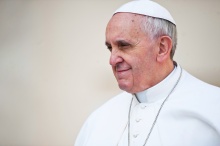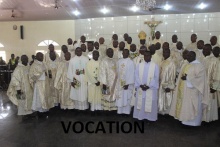The Pope proposes an antidote to the problem of the “multiplication of null and inconsistent marriage celebrations”: “A new catechumenate in preparation for marriage,” that is to say, “an appropriate path of preparation geared to rediscover marriage and the family in keeping with God’s design,” which is “part of the sacramental process” as for Baptism.
The Pontiff expressed this indication during an audience this morning to Prelate auditors, officials, lawyers and collaborators of the Tribunal of the Roman Rota, received on the occasion of the solemn opening of the Judiciary Year. His reflection focused on today’s context that, “lacking in religious values and faith, cannot but condition also the marital [consensus]. “
The Pope is concerned about that “widespread mentality” that “tends to obscure access to eternal truths” and “often involves, in a vast and capillary way, the attitude and behavior of Christians themselves, whose faith is weakened and loses the originality of interpretative and operative criteria for personal, family and social existence.”
“Great courage is needed to get married in the time in which we live,” Pope Bergoglio noted, as he has on other occasions. “All those who have the strength and joy to take this important step must feel alongside them the affection and concrete closeness of the Church.” Also because “the experiences of faith of those requesting a Christian marriage are very different”: some “take part actively in the life of the parish”; others “approach it for the first time”; some “even have an intense life of prayer.” Then there are those who, instead, are guided by a more generic religious sentiment” or persons who are “far from faith or lacking in faith.”
In face of this situation, it is necessary to find “valid remedies,” affirms Francis. The first is, without a doubt, the “formation of young people, through an appropriate path of preparation geared to rediscovering marriage and the family in keeping with God’s design.” Today more than ever, a preparation of this nature “appears as a true and proper occasion of evangelization of adults and, often, of the so-called estranged,” remarks the Pontiff, quoting Familiaris Consortio about the need for a “new catechumenate.”
In the light of Wojtyla’s exhortation, and also of the directives of recent Synods on the Family, the Pope expressed the hope that “the preparation for marriage may become an integral part of the whole sacramental procedure of marriage, as antidote that impedes the multiplication of null and inconsistent marriage celebrations,” underlined the Pope.
Suggested as second remedy to newlyweds is help “to continue the journey in the faith and in the Church also after the celebration of the marriage. It is necessary to single out, with courage and creativity, a plan for formation for young spouses, with initiatives geared to a growing awareness of the Sacrament received,” stressed the Bishop of Rome.
The whole Christian community is challenged to “receive, accompany and help” young couples, “offering occasions and appropriate instruments — beginning with participation in Sunday Mass — to take care of the spiritual life, be it within family life, be it in the ambit of pastoral programming in the parish or in aggregations.”
Too often “young spouses are left to themselves, perhaps because of the simple fact that they are less seen in the parish. This happens especially with the birth of children,” noted the Holy Father. On the contrary, “in these first moments of family life, it is necessary to guarantee greater closeness and strong spiritual support, also in the educational work of children, who are the first witnesses and bearers of the gift of faith.”
For the Pope, it is necessary to render “intelligible and real” the “synergy between foedusand fides,” to move, namely, from a narrowly juridical and formal vision of the preparation of future spouses, to a sacramental foundation ab initio, namely beginning from the journey towards the fullness of their foedus-consensus elevated by Christ to a Sacrament.”
“Love is in need of truth,” concluded Francis finally, recalling Benedict XVI’s words in his last address to the Roman Rota. “It is all the more necessary to deepen the relation between love and truth. Only in so far as it is founded on truth can love last in time, overcome the ephemeral instant and remain firm to support the common journey. If love does not have a relation with truth, it is subject to the change in sentiments and does not surmount the test of time. Instead, true love unifies all the elements of our person and becomes a new light towards a great and full life. Without truth love cannot offer a solid bond, it is unable to lead the I beyond its isolation, or to free it from the fleeting instant to build life and bear fruit.”
Source: Zenit


